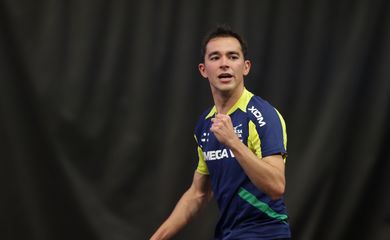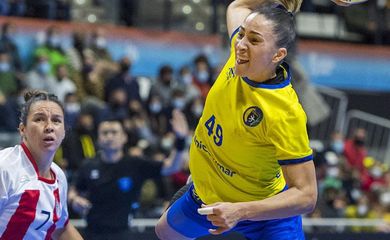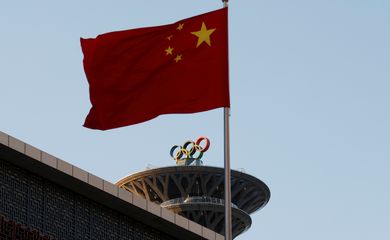Column - Sitting volleyball starts cycle with news and hope for gold

The men's Brazilian Championship, won by Sesi-SP last Friday (3) , ended the 2021 season of volleyball sitting in the country. Attention is now turning to 2022, the first full year of the Paralympic cycle in Paris (France), in which the men's and women's teams will face the World Cup in Hangzhou (China), between May 18 and 23, in addition to the qualifying tournament for the 2023 Worlds, if the new coronavirus pandemic (covid-19) allows it. On the national scene, the forecast is for two more events: a competition open to teams from abroad and a Cup in Brazil, bringing together the two best teams from each state.

In the Paralympic Games in Tokyo (Japan), Brazil repeated the result of five years before, in Rio de Janeiro. The men's team was fourth and the women again won the bronze medal, beating Canada in the dispute for third position.
“[The bronze] was the possible result. It could have been better, but they [the United States, which beat Brazil in the semifinals] played better and had opportunities that we didn't have. They and the teams from Europe did not stop training, they played friendlies, while the Brazilian team was not invited, due to the pandemic”, analyzed captain Nathalie Filomena to Agência Brasil .
“Everyone had challenges, but near Tokyo, we saw that other teams were able to play more. Some participated in a championship in the Netherlands. The pandemic got in the way a little of what we were planning, which was to pick up the pace. It's no excuse, the US has all the merits, but I think that, because of what we've been through, we've achieved an incredible result”, completed Luiza Fiorese, also a bronze medalist in Japan .
After the Games, there was an exchange in the men's committee, with the departure of Célio César Mediato, current coach of Sesi, and the return of Fernando Guimarães, brother of three-time Olympic champion coach José Roberto Guimarães, who directed the team at Rio 2016. , the Brazilian Volleyball Confederation for the Disabled (CBVD) wants to keep José Agtônio Guedes. The commander, who has been in charge of the selection since the 2016 cycle, was recently sworn in as national secretary of Parasport at the Ministry of Citizenship.
“Fernando is at the Paulistano/Ethics Institute, he left [the selection] after the 2016 cycle. We understood at the time that we should change, but he is one of the best technicians in Brazil. [About Guedes] we are waiting for an answer. He has this big, big demand, but we can't lose a coach like him. We spent three days in Brasilia talking. He grew up seeing these girls and is part of that story. I'm sure it will work and it will continue”, stated the president of CBVD, Ângelo Alves Neto.
The goal for 2024 is the achievement of unprecedented Paralympic gold, among men and women. The optimistic speech gained momentum after the announcement that the selections will be sponsored by Audi, a German multinational in the automobile sector, during the Paris cycle. According to Neto, the partnership, made official last Friday, will allow for longer periods of training for national teams, reinforcement of technical committees and participation in more events.
“In Tokyo, as there was a reduction in commissions [due to the pandemic], we had a coach, assistant, physiotherapist and statistician [in the delegations]. We are going to look for professionals in the sports field, such as a psychologist, nutritionist, physiologist and physical trainer. We will also be at more international championships, for athletes to experience matches against the people we will meet in Paris. We will already have one more championship [in 2022], which is the Sarajevo Open [Bosnia], male and female”, said the manager.
The partnership draws attention as private initiative support for parasports is still uncommon, despite the increased visibility. The petrochemical company Braskem, for example, works with the Paralympic athletics team. Toyota, a Japanese automobile multinational, sponsors the Brazilian Paralympic Committee (CPB). Companies like Nissan (also motorsport) and Ajinomoto (food), in turn, support specific athletes in different sports. Even so, the public sector, through the Agnelo/Piva Law (which allocates lottery resources to Paralympic sports) or programs such as Bolsa Atleta, is responsible for the overwhelming majority of the incentive.
“In addition to the financial support, sponsorship brings a name, it believes in us. This inflates the desire to want more, from a person who arrives and sees that this team has potential. Many girls come [to the sport], but not all of them stay. We want to make them stay”, evaluated Luiza, who replaced part of the bones in her left leg with an internal prosthesis, due to an osteosarcoma (bone cancer), and joined volleyball sitting in 2019.
“When I started [in sitting volleyball], in 2006, we had nothing, investment, sponsorship. I know what each girl has suffered. If it was already difficult and we achieved [conquests], although not what we want yet, which is to hear the Brazilian anthem at the top of the podium, with more training and investment we can reach higher places. The gold medal dream is possible today”, concluded Nathalie, who was born with a brachial plexus (network of nerves between the cervical spine and the left shoulder), as well as mild paralysis on the same side, and participated in three Paralympics in her career .
Text translated using artificial intelligence.




